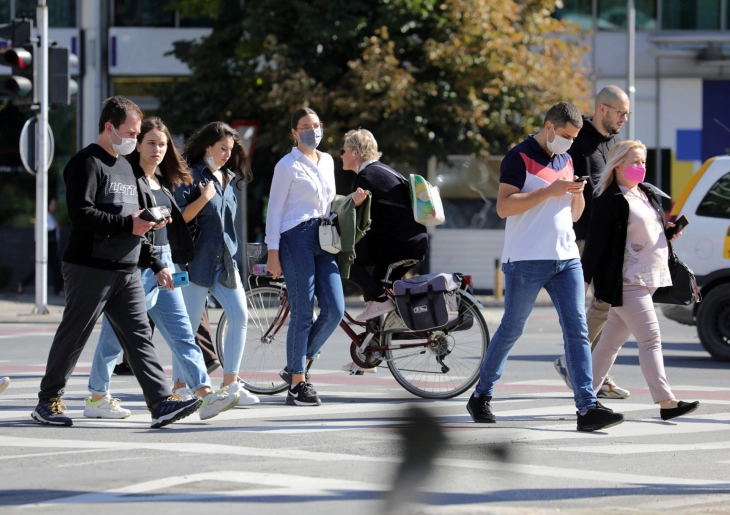Increased socialization, low volunteering awareness, citizens deem state most responsible for societal problems: research

Skopje, 31 October 2022 (MIA) – People in the country are increasingly socializing, usually with their families (66.6%), friends (54.9%) and less with work colleagues (30.4%). The number of people visiting religious places of worship has also grown (29.9%). Age, finances and education affect socialization. Younger people, those with higher incomes and those with completed high school or university education hang out with their friends and colleagues more often, as well as allocating more time for sports or recreational activities, according to data from the research titled "Societal responsibility of the citizens” by the Macedonian Center for International Cooperation (MCMS).
A significant drop in citizen participation in non-party activities was noted in comparison to the research from 11 years ago. 15% have said that they sign petitions in comparison to 25.7% in 2010. Around 14% took part in peaceful protests as opposed to the 36.6% who did that 11 years ago.
Citizens aged between 30-49 with higher degrees of education are most active in non-party activities.
“The number of citizens who are members of any form of association has increased compared to 2010. Churches and religious organizations are the most attractive for citizens, i.e. 43.6 percent of them are their active or inactive members. 11 years ago, churches and religious communities were third in terms of the number of citizens who are members of them (30.7 percent), and now they have the highest membership,” the research shows.
Political parties are ranked second with 39.1 percent, and 11 years ago they were ranked first with 37.5 percent. The number of active members in political parties grew by 4.2%, while the number of inactive members decreased by 2.6%.
In addition to churches, an increase is also observed in civil organizations, for which a total of 36.8 percent of citizens declared that they are members of a civil organization. Age, education and class affiliation influence membership in civil society organizations. The young population with higher education belonging to the middle classes is mostly a member of civil society organizations, and the possibility of employment is the biggest motive for membership and involvement in the work of civil society organizations.
In the research, a significant drop is also observed in voluntary actions, only 7.6 percent of citizens stated that they participated in voluntary actions in the last 12 months, while in 2010 this percentage was 21.9.
“The low awareness of volunteer engagement can be seen from the opinion of a large part of the respondents that there were no volunteer activities in the community in the last year, which points to low self-initiative of citizens and dependence on mobilization,” the research says.
There is also a large drop in charitable giving over the past 12 months compared to the survey conducted 11 years ago. In 2021, 27.0 percent of citizens donated to charity, while in 2010 this percentage was 65.2 percent.
“The high percentage of citizens who, although they did not donate, are willing to do so, is encouraging. Citizens donated mostly for humanitarian purposes, according to MCMS.
For the majority of citizens, i.e. 57.5 percent, the state is most responsible for solving social needs.
In 11 years, this figure grew by seven percentage points. On the other hand, in the same period, the number of those who believe that the responsibility should be shared dropped by about 10 percentage points (from 33.4 percent to 23.2 percent).
With the research, the public spirit of the citizens was checked by evaluating the degree of justification of several generally socially unjustified activities. The number of citizens for whom it is unjustified to pay in cash for services in order to avoid taxes has increased by almost 21 pp and now amounts to 83.4 percent, in contrast to 2010 when it was 62.6 percent, according to MCMS.
For 93.4 percent of citizens, cheating on taxes, if there is a chance, is unacceptable. On the other hand, the responsibility of the citizens for themselves (driving under the influence of alcohol) and the environment (throwing garbage in places that are not designated for it) has been slightly reduced.
MCMS adds that the citizens' sense of responsibility for influencing, participating and solving social problems is an essential component for the development of civil society, as well as society as a whole.
"Civil society without citizens participating in it cannot fulfill its mission. It is a rooted and influential civil society that is one of the long-term goals of MCMS. Such a civil society is based on active citizens or socially responsible citizens, as stakeholders in society. For these reasons, MCMS investigates civil society, and especially the trust and social responsibility of the citizens," the research says.
MCMS first surveyed social responsibility in 2006, along with trust, while separate surveys were conducted in 2007, 2009, 2010 and 2021. dk/nn/







